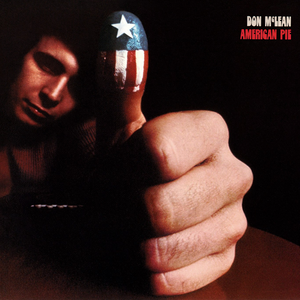McLean's grandfather and father, both also named Donald McLean, had roots originating in Scotland. The Buccis, the family of McLean's mother, Elizabeth, came from Abruzzo in central Italy. They left Italy and settled in Port Chester, New York at the end of the 19th century. He has other extended family in Los Angeles and Boston. Though some of his early musical influences included Frank Sinatra and Buddy Holly, as a teenager, McLean became interested in folk music, particularly the Weavers' 1955 recording At Carnegie Hall. He often missed long periods of school because of childhood asthma, particularly music lessons, and although McLean slipped back in his studies, his love of music was allowed to flourish. By age 16, he had bought his first guitar and began making contacts in the music business, becoming friends with the folk singers Erik Darling and Fred Hellerman of the Weavers.
McLean recorded Tapestry in 1969 in Berkeley, California during the student riots. After being rejected 72 times by labels, the album was released by Mediarts, a label that had not existed when he first started to look for a label. He worked on the album for a couple of years before putting it out. It attracted good reviews but little notice outside the folk community, though on the Easy Listening chart "Castles in the Air" was a success, and in 1973 "And I Love You So" became a number 1 Adult Contemporary hit for Perry Como.
McLean's major break came when Mediarts was taken over by United Artists Records, thus securing the promotion of a major label for his second album, American Pie. The album launched two number one hits in the title song and "Vincent". American Pie's success made McLean an international star and piqued interest in his first album, which charted more than two years after its initial release.
In 2004, he was inducted into the Songwriters Hall of Fame. In January 2018, BMI certified that "American Pie" and "Vincent" had reached five million and three million airplays respectively.
His composition "And I Love You So" has been sung by Elvis Presley, Perry Como, Helen Reddy, Glen Campbell, and others, and in 2000, Madonna had a hit with a rendition of "American Pie". His other hit singles include "Vincent" (US #12, UK #1 in 1972), "Dreidel" (US #21 in 1972), a rendition of Roy Orbison's "Crying" (US #5, UK #1 in 1980), a rendition of the Skyliners' "Since I Don't Have You" (US #23 in 1980), and "Wonderful Baby" (US AC #1 in 1975).
Babylon
Don McLean Lyrics
Jump to: Overall Meaning ↴ Line by Line Meaning ↴
We lay down and wept, and wept, for thee Zion
We remember thee, remember thee, remember thee Zion
By the waters, the waters of Babylon
We lay down and wept, and wept, for thee Zion
We remember thee, remember thee, remember thee Zion
By the waters, the waters of Babylon
We lay down and wept, and wept, for thee Zion
The lyrics for Don McLean's song "Babylon" are based on the biblical story of the Jewish people being exiled to Babylon. The first verse starts with "By the waters, the waters of Babylon," which is a reference to the famous Psalm 137, where it says "By the rivers of Babylon, there we sat down and wept when we remembered Zion." The Jewish people were taken out of their home, Jerusalem, and forced to live in Babylon, where they longingly remembered their homeland. This is what the rest of the song is about, with the repetition of "We lay down and wept, and wept, for thee Zion" and "We remember thee, remember thee, remember thee Zion."
The song is about exile, but it's not necessarily about the biblical story specifically. Don McLean wrote it during the Vietnam War, and it was released in 1971, which was a time when many people in the United States were feeling a sense of displacement and disconnection from their country because of the conflict. The song can be interpreted as a metaphor for the feelings of isolation and longing that people experience when they are far from home, whether that's a physical place or a sense of belonging. The song ends with the lyrics "But the wicked carried us away, captivity required from us a song / How can we sing King Alpha's song in a strange land?" which suggests that even in a difficult situation, the Jewish people still found a way to hold onto their faith and cultural identity.
Line by Line Meaning
By the waters, the waters of Babylon
In Babylon, by the riverside
We lay down and wept, and wept, for thee Zion
We cried and cried because we missed Zion
We remember thee, remember thee, remember thee Zion
We will never forget Zion
By the waters, the waters of Babylon
In Babylon, by the riverside
We lay down and wept, and wept, for thee Zion
We cried and cried because we missed Zion
We remember thee, remember thee, remember thee Zion
We will never forget Zion
By the waters, the waters of Babylon
In Babylon, by the riverside
We lay down and wept, and wept, for thee Zion
We cried and cried because we missed Zion
We remember thee, remember thee, remember thee Zion
We will never forget Zion
Lyrics © Universal Music Publishing Group
Written by: Traditional, Don McLean, Lee Hays
Lyrics Licensed & Provided by LyricFind

The Goddess
on The More You Pay
No. As The Auctioneer explains "what we don't sell we shoot or give away - cuz the more you pay, the more it's worth" so the horse is given to the persona/narrator rather than shooting it to death. The Gallery goes wild in celebration that the horse will go to someone instead of being killed.
Joe Boxer
on Vincent
https://m.youtube.com/watch?v=dcWFYtG8RFM